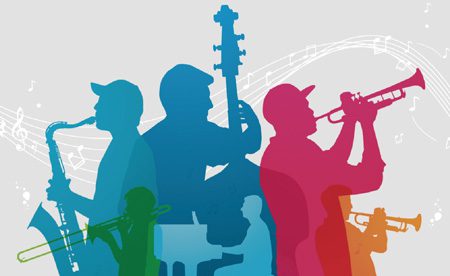The Four Keys to Happiness: Advice from the Lakeside Curmudgeon

When I was 12 years old, I took up the sousaphone—an oversized tuba that wraps around the body and is named after John Philip Sousa, the man who was obsessed with writing marches. I didn’t choose to play such a concoction of plumbing, but was asked to do so by Mr. Zucker, the junior high school band teacher who looked like Groucho Marx. “You are big for your age,” he told me. “In fact, you are the only seventh grader who can pick it up without getting a hernia.” In 1957, I didn’t know what a hernia was, but I knew I didn’t want one. And even if I really wanted to learn to be a trumpeter, I agreed to Mr. Z’s request.
I always did the right thing, even if I didn’t want to.
Ours was not a marching band, so I didn’t have to actually walk around with the thing very much. Except when I had to fetch it from its shelf in the music storage closet and carry it to the sousaphone chair—a straight-backed device with various adjustable metal rods, screws, and sundry gizmos attached to it that made it look like an electric chair. I had to make sure to carefully place the big horn into correct position in the chair and then tighten the screws so that the restraining devices would hold it in place. Once that was done, I had to get on my knees in front of the contraption, crawl into it head first, and know exactly when to twist my body into position so that I would end up facing forward and be able to sit in the chair. I sometimes felt that I was a spy who had been sentenced to be electrocuted. Other times, I felt like I was attempting to get back to the womb.
Nevertheless, I learned to play the instrument better than anyone else I knew, which was easy to do because I didn’t know anyone else who played it.
Six months later came the annual spring concert, when we band students could show off to our families and friends. I was assigned to play a sousaphone solo in the middle of the “Flight of the Bumble Bee.” As always, I was jittery about performing before an audience. And that spring evening in 1958 was no exception. Picture it:
The clarinets were buzzing, the bass drum was attempting to egg them on (and was terribly offbeat in the process), and my three-measure solo was fast approaching. The beads of sweat on my forehead were starting to run into my eyes; my hands were so clammy that I feared they would slip off the sousaphone keys, even if there were only three keys. Faster and faster the music went, with those little pre-pubescent clarinetists’ fingers dancing over the buttons, often missing them and often squeaking. I am sure had our musical piece de resistance been the “Minute Waltz” we would have finished it in 43 seconds! But my time to star in our current musical offering was getting closer and closer. My heart was about to pop. Two more measures to go. Then one. Mr. Zucker looked at me hopefully. Then two more notes. I took a deep breath, instinctively leaned forward in the electric chair, and blew so hard that the chair tilted forward with me and the plumbing, and in an attempt to prevent from toppling over, I leaned back too far, and the chair and big horn fell backward on top of me, causing my larger-than-average shoes with their built-in arches to go up in the air. I felt like Bozo the Clown.
The rest of the “orchestra” ceased playing. And after a collective gasp from everyone in the auditorium, there was only silence. Everyone was in shock. But then the first little chuckle started somewhere in that audience of culture vultures, followed by another, and then another until the entire room was having one big guffaw at my expense! Oh, I was not hurt physically, but my pride was snuffed out that day. Lying on the floor trapped in the electric chair, with the sousaphone on top of me, I remember trying to laugh with everyone else, but deep within me, I was humiliated; I was crushed. I just wanted to run away.
But I was stuck—literally.
*****
Eventually, I got unstuck. But it took years. I kept playing the sousaphone in junior and senior high school (including being showcased for four seconds on national television while marching with my plumbing on a very frigid day during the Philadelphia Thanksgiving Day Parade in 1961). Still, I never wanted to play the damn thing in the first place. And yet:
I always did the right thing, even if I didn’t want to.
Even if I really wanted to be Keith Dinger, our drum major, and the leader of the pack. I wanted to wear his fancy, well-tailored uniform with the golden sash and coordinating epaulets, buttons, and tassels. I wanted to don his high hat with the flowing plumes. And blow his whistle. And thrust his golden mace into the heavens. I wanted to be six feet tall and imperially slim. I wanted to have perfect teeth. And be cocky as hell because of it all. I despised being in the back row. Lugging around the plumbing. Being the oompah guy. Getting my lips stuck on the frozen mouthpiece. Having my back “go out” because of all that excess weight. Being invisible except for those four seconds on television, according to Mrs. Boyle, our next-door neighbor, who was the only person who saw me that day. Then again, Mrs. Boyle loved her cocktails and saw lots of things nobody else did.
But I continued to do the right thing during the parade and for decades after it. I followed the beat. I blended in with the rest of the group. I played the notes as written. I followed the composer’s work as interpreted by the conductor.
I did what others told me to do. Even if I didn’t want to. Musically that included learning to play various instruments and to sing, but always obeying the directions of others. Even if I suspected that maybe I wanted to march to the beat of my own drum—musically or otherwise. Then, one day I dropped the sousaphone (symbolically) and auditioned to be the high school choir’s piano accompanist. I won the audition hands down. No longer was I the oompah guy in the back of the band. I was the front man on stage. People knew who I was at last. I was even voted the “Most Talented Boy” by my graduating class and got my photo in the high school yearbook as one of the “Senior Ideals.”
I was getting unstuck!
*****
Fast forward six decades to Lakeside. I now play professional jazz piano. At long last, I feel that I am doing the right thing. This means that I am mostly unstuck these days. I express who I want to be musically. This freedom makes me very happy and comes to me because I am being creative, not merely imitative. I am my own band director and drum major. The four basic aspects that constitute the jazz I play are also ones I apply to the life I now lead. Here they are:
The Four Keys to Happiness: Advice from the Lakeside Curmudgeon . . .
1. Syncopate: Put the accent on beats you might not normally accent. Be offbeat.
Sometimes things do not go according to plan. Sometimes there are reasons that make sense, sometimes there aren’t. One’s understanding of “how it’s supposed to be” might not fit here. Life can be like that anywhere, but in this vibrant, diversified, and growing community we live in, we cannot always keep the beat we are used to.
2. Be polyphonic: Create your individual sound while harmonizing with the individual sounds of others.
It happens in classic jazz bands. No one performer just does his/her thing. Each musician contributes to the community of sound. Each shares a common purpose: to express unity in diversity. They blend together. And often, individual performers are showcased for a few measures while the rest of the band supports them.
3. Improvise: Make it up as you go along. Ad lib.
This implies freedom to question, to explore. It is about change, process, fluidity, growth—rather than sameness, stricture, entrenchment, and stagnation. It’s the same in jazz music. You have to trust yourself, your acquired and innate skills. Listen to that deep, intuitive self. Hear what your instinct is suggesting to you.
4. Distort: Deliberately alter the pitch (key) and timbre (sound).
Jazz performers—and their audiences as well as those who follow the beat of their own drum—have been labelled by detractors as reprobates, radicals, and “heretics” (a word of Greek origin meaning: one who is free to make choices). Such “heretics” feel compelled to alter the key and sound. And sometimes everyone else has to do so as well.
Yes, this is a time in world history that is requiring all of us, wherever we live on the planet, to adjust to ways we never expected we would be asked to do. I am thankful that there is music to help us in this process (for me, jazz in particular). Indeed, I agree with the philosopher Friedrich Nietzsche who wrote: Life without music would be a mistake.
So, c’mon, Lakeside, let’s be about Jazzing It Up in Magic Town!
- Lakeside Living – April 2024 - March 29, 2024
- THE FOOL WITHIN US - March 29, 2024
- Lakeside Living – March 2024 - February 29, 2024








